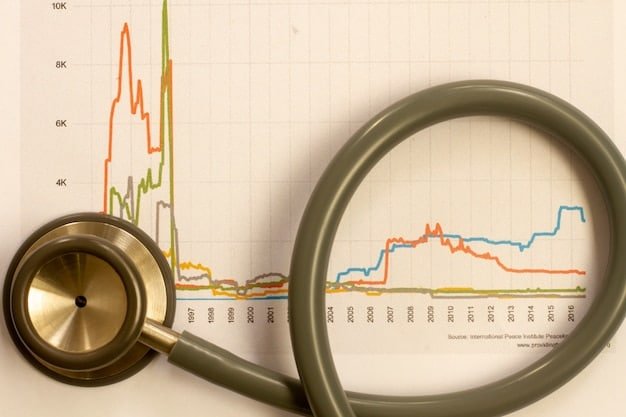Healthcare Cost Projections for Retirees: A 2025 Update

Healthcare cost projections for retirees in 2025 reveal that comprehensive financial planning must consider inflation, long-term care needs, and policy changes to ensure financial security during retirement.
Planning for retirement involves many considerations, and among the most critical is understanding your future healthcare expenses. The landscape of healthcare cost projections for retirees: A 2025 financial planning update suggests some strategic adjustments are needed to ensure a financially secure retirement.
Understanding 2025 Healthcare Cost Estimates for Retirees
Predicting healthcare costs is a complex yet essential part of retirement planning. Several factors, like inflation, advancements in medical technology, and changes in healthcare policies, play a role in shaping these estimates. It’s crucial to stay informed about these trends to create a realistic retirement budget.
Key Factors Influencing Healthcare Costs
Several elements contribute to this rise, understanding these is vital for retirees and those planning for retirement.
- Inflation: The rising cost of medical services and prescription drugs.
- Aging Population: As people live longer, the demand for healthcare services increases.
- Medical Advancements: New technologies and treatments often come with a higher price tag.
Understanding these factors forms the basis of estimating what healthcare costs might look like for individuals entering or already in retirement.

The Impact of Inflation on Healthcare Expenses
Inflation affects all sectors of the economy, and healthcare is no exception. Medical inflation, which often outpaces general inflation, can significantly erode the purchasing power of retirement savings. Retirees need to factor in an adequate inflation buffer to cover rising healthcare costs.
Considering medical inflation is one of the first steps for retirees in financial planning to mitigate unexpected costs.
Strategies to Combat Healthcare Inflation
To mitigate the impact of medical inflation, retirees can explore different strategies that could help maintain financial stability.
- Health Savings Accounts (HSAs): Utilizing HSAs to save pre-tax dollars for healthcare expenses.
- Negotiating Prices: Inquiring about cash prices and negotiating with healthcare providers.
- Preventive Care: Investing in preventive care to avoid costly medical treatments down the road.
Taking measures such as these will ensure that the effect of inflation on one’s finances during retirement can be significantly reduced.
Long-Term Care Considerations in Retirement Planning
Long-term care (LTC) is a significant component of healthcare expenses that retirees often underestimate. LTC encompasses a range of services, including nursing home care, assisted living, and in-home care. Planning for LTC is essential to protect retirement savings from unexpected costs.
Understanding what long-term care includes helps one plan better for one’s retirement and for the potential costs involved.
Funding Long-Term Care Needs
There are several ways retirees can plan to pay for all potential long-term care needs that may arise without much warning.
- Long-Term Care Insurance: Purchasing LTC insurance to cover the costs of care services.
- Life Insurance with LTC Riders: Using life insurance policies with riders that can be used for LTC expenses.
- Medicaid Planning: Strategizing to qualify for Medicaid benefits to cover LTC costs.
Planning ahead for potential long-term care needs is as important as retirement planning itself.

Medicare and Supplemental Insurance Options
Medicare is a federal health insurance program for individuals aged 65 and older, as well as certain younger people with disabilities. While Medicare covers many healthcare services, it doesn’t cover everything. Retirees should familiarize themselves with the different parts of Medicare and consider supplemental insurance options to fill coverage gaps.
Knowing the ins and outs of Medicare and how it impacts you ensures greater financial planning during your retirement.
Understanding Medicare Parts A, B, C, and D
Understanding the different parts of Medicare and what each covers is essential for retirees in retirement planning. This will enable them to decide what needs to be planned for and what is already covered.
- Part A (Hospital Insurance): Covers inpatient hospital stays, skilled nursing facility care, and hospice care.
- Part B (Medical Insurance): Covers doctor visits, outpatient care, and preventive services.
- Part C (Medicare Advantage): Combines Part A and Part B coverage and may offer additional benefits.
- Part D (Prescription Drug Insurance): Covers prescription medications.
Understanding each part allows retirees to plan and budget for any potential further healthcare needs.
Strategies for Managing Out-of-Pocket Healthcare Costs
Even with Medicare and supplemental insurance, retirees still face out-of-pocket healthcare costs, such as deductibles, copayments, and coinsurance. Managing these expenses requires careful planning and budgeting.
Strategizing how to manage out-of-pocket costs is as important as the other areas of considerations.
Budgeting and Saving Tips for Healthcare
Saving and budgeting are two measures that must be considered when strategizing for healthcare.
- Creating a Healthcare Budget: Setting aside a specific amount each month to cover medical expenses.
- Exploring Cost-Saving Options: Considering generic medications, telehealth services, and community health clinics.
- Reviewing Insurance Coverage: Periodically reviewing insurance coverage to ensure it meets current needs.
A simple measure such as regularly reviewing insurance coverage to ensure it is up to date and meets your needs can significantly reduce potential out-of-pocket costs.
The Role of Health Savings Accounts (HSAs) in Retirement
Health Savings Accounts (HSAs) are tax-advantaged savings accounts that can be used to pay for qualified medical expenses. HSAs offer a triple tax benefit: contributions are tax-deductible, earnings grow tax-free, and withdrawals for qualified medical expenses are tax-free. For retirees, HSAs can be a valuable tool for managing healthcare costs.
Understanding what HSAs are and the role they play in an individual’s retirement planning considerations is a vital step toward enabling effective financial planning.
Maximizing HSA Benefits in Retirement
There are some considerations and key benefits that need to be taken into account when seeking to maximize your HSA benefits during retirement.
- Contributing to an HSA: Making contributions to an HSA while still employed to build up savings.
- Using HSA Funds Wisely: Using HSA funds to pay for qualified medical expenses in retirement.
- Investing HSA Funds: Investing HSA funds to grow savings over time.
There are a number of key considerations and benefits to take into account when seeking to optimize HSA benefits during retirement.
In summary, the comprehensive considerations above could significantly contribute towards more confident financial planning for retirees.
| Key Point | Brief Description |
|---|---|
| 💰 Inflation Effects | Medical inflation outpaces general inflation, eroding savings. |
| 🏥 Long-Term Care | Planning for LTC is vital to protect retirement savings. |
| 💊 Medicare Options | Understand Medicare & supplemental insurance to fill coverage gaps. |
| ⚕️ Health Savings Accounts | HSAs offer tax advantages for managing healthcare costs. |
Frequently Asked Questions
▼
▼
▼
▼
▼
Conclusion
Effective financial planning for retirement necessitates a comprehensive understanding of potential healthcare costs. By considering factors like inflation, long-term care, and available insurance options, retirees can better manage their financial well-being and ensure a secure future.





